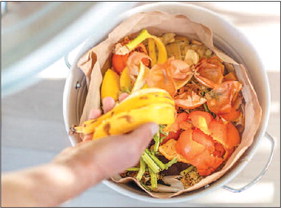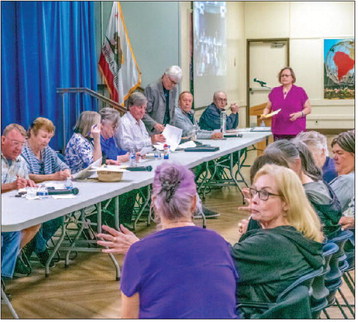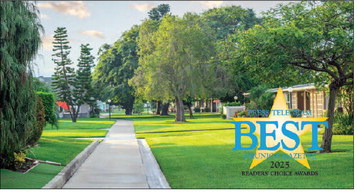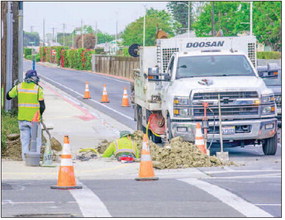California law defines composting requirements


SUSTAINABILITY
As of Jan. 1, 2022, people and organizations throughout California are required to separate organic material (mainly food scraps and yard waste) from other garbage. Athens Services, Leisure World’s trash provider, implemented the food scrap collection program in late 2022 with the delivery of organics carts to all Mutual trash collection areas. Residents began separating their trash in a new way to comply with Senate Bill 1383.
According to CalRecycle, since the bill was implemented in 2022, 75% of California communities report they have implemented the residential organic waste collection program. That’s 465 out of 616 jurisdictions; 126 jurisdictions were given more time to comply.
Some Mutual presidents have recently reported that residents are steering clear of using the organics carts because they can draw flies and smell bad. But the key to preventing odors and insects is to bag all compost before depositing it in the bin provided by Athens.
Plastic and bioplastic “compostable” bags are accepted in the organics container, but must be clear or translucent-green, so bag contents are visible. Ac-ceptable organics will be processed, but the bags will not be recycled or composted. The GRF Purchasing Department sells compostable food scrap bags for $14.30 for a box of 48 bags, or they can be easily purchased online or from other retailers.
What is Composting?
Composting is the natural process of breaking down biodegradable materials into a rich soil known as compost. The process of composting can be done with scraps from many different types of food—including fruit, vegetables, meat, bones, fish, shellfish, eggshells, bread, grains and coffee grounds.
Paper towels and cardboard are also compostable. Foodsoiled pizza boxes can become compost.
Benefits of Composting Food Californians throw away nearly 6 million tons of food scraps each year, which represents about 18% of all the material that goes to landfills, according to CalRecycle. When organic waste breaks down in a landfill, it releases methane into the atmosphere. As a primary component of natural gas, methane traps heat in the earth’s atmosphere. To mitigate this, California is working to reduce organic waste in landfills by 75% from 2014 levels by 2025.
Participating is easy. 1. FILL: Fill a countertop pail with food scraps and acceptable items. (Liners are optional. Consider newspaper or a paper bag. Plastic bags must be clear.)
2. EMPTY: Empty pail contents into the organics carts provided by Athens. Athens Tip: Store meat and dairy scraps in a container in your freezer and place in the green organics container on collection day.
3. RINSE & REPEAT: Rinse out pail with soap and water. Fill again. Sprinkle lightly with baking soda to absorb odors. Acceptable Organics Waste Green Waste
• Flower and hedge trimmings (from personal gardening) • Grass clippings
• Leaves and branches
• Lumber, scrap wood, plywood (not painted or treated)
• Weeds
To avoid unpleasant odors in and around green bins, residents should make sure to put all scraps in a compostable bag. At home, people can store compostable scraps in the freezer.
Stock Image
Food Scraps
• Bread, rice and pasta
• Cheese and dairy
• Coffee grounds and filters
• Fruits and vegetables
• Flowers and herbs
• Meat, bones and poultry
• Seafood and soft shells
• Pet food (non-medicated) Food-Soiled Paper
• Food-stained paper
• Paper egg cartons
• Paper napkins and kitchen towels
• Pizza boxes
• Plates
• To-go boxes (no coating)
• Wooden and fiber-based utensils Food-soiled paper must be 100% fiber-based (no materials with petroleum based plastic, wax or bio-plastic coating, liner or laminate).
Unacceptable Organics Waste (Do Not Include)
• All plastics
• Cacti, succulents, yucca
• Compostable plastics (bioplastics) • Coffee cups and pods
• Fats, oils and grease
• Food stickers (remove from produce)
• Gloves
• Hard shells (clams, mussels, oysters)
• Medication
• Palm fronds
• Paper napkins, towels with cleaning chemicals
• Parchment and wax paper
• Pet waste
• Rocks and soil
• Rubber bands and twist ties For more information, visit AthensServices. com/ Food or call the Athens Customer Care Center at 888-336-6100. Find out more about SB1383 at Cal-Recycle.ca.gov/Organics/SLCP.





